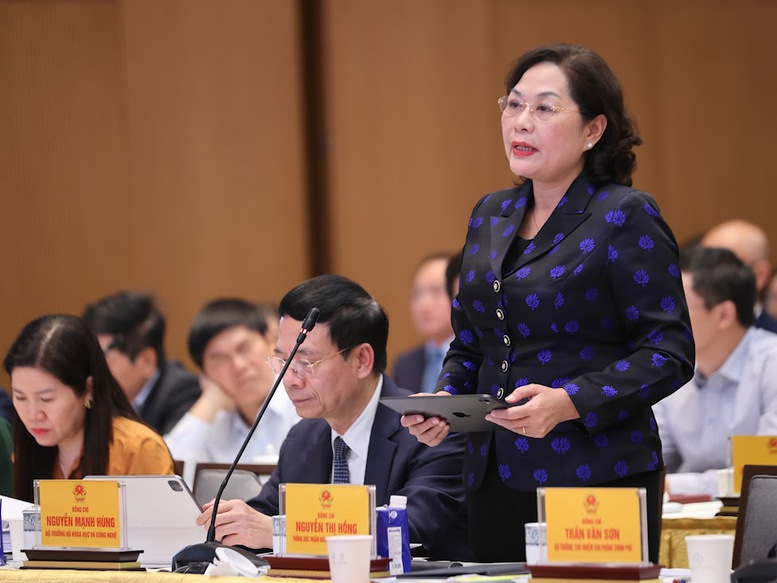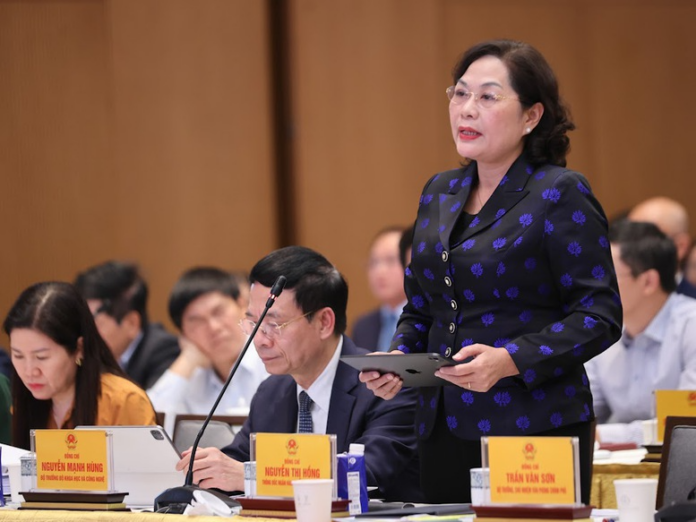
Governor of the State Bank of Vietnam, Nguyen Thi Hong – Photo: VGP/Nhat Bac
On the issue of credit, Governor Hong shared insights on the private sector’s loan balance as a proportion of the total outstanding debt in the economy. She highlighted that while state-owned enterprises previously dominated credit allocation, the current ratio of private sector debt to total economic debt stands at 92-93%. This figure not only reflects the growth of the private sector but also demonstrates the efforts and dedication of the banking system.
Citing data from the Ministry of Finance’s workshop report, Governor Hong pointed out that micro, small, and medium-sized enterprises (MSMEs), which account for nearly 98% of the total number of enterprises, have access to less than 20% of the total outstanding credit in the banking system, while private sector debt accounts for 93%. The report also acknowledged that while there are numerous private enterprises, they often operate on a small scale with limited competitiveness, inefficient operations, and less-than-adequate management skills and labor productivity. Additionally, a lack of transparency in information disclosure among some enterprises was highlighted as a challenge in their ability to secure loans from banks.
“I strongly agree with the remarks made by economist Tran Dinh Thien, emphasizing the need for efforts from both sides. We hope that enterprises will demonstrate determination and resolve, as expressed during the workshop discussions. From the banking sector, we have been diligently instructing our units to implement the spirit of Resolution 68. The banking industry earnestly requests the Government’s guidance and directives to implement effective solutions for credit guarantees for enterprises, as well as develop other segments of the financial market, as suggested by several delegates,” Governor Hong shared, emphasizing that such collaborative efforts will undoubtedly increase credit access for MSMEs, enhance the credit cycle within the system, and ensure that more enterprises benefit from these loans.
Addressing the issue of interest rates, Governor Nguyen Thi Hong acknowledged that despite global interest rate hikes, the banking industry has made concerted efforts to manage and regulate a reduction in the overall interest rate level. She commended the sense of responsibility and humanity demonstrated by credit institutions in lowering interest rates to support businesses and individuals affected by the Covid-19 pandemic, natural disasters, and floods, with a total value of VND 60,000 – 70,000 billion. Additionally, the industry has launched several credit packages, including loans for the seafood sector and housing loans for low-income individuals, utilizing the financial resources of credit institutions rather than state budget funds. In reality, some enterprises incur high-interest expenses due to prolonged investment, production, and business procedures.
The State Bank of Vietnam recognizes the significance of streamlining procedures and amending laws, such as the Law on Investment, the Law on Bidding, and the Law on Real Estate Business, to reduce processing time, accelerate capital turnover, improve capital access for businesses, and facilitate interest rate reductions.
Governor Hong acknowledged that credit and interest rates are perennial concerns for businesses, spanning multiple terms and administrations. She emphasized that, in addition to overseeing the lending activities of credit institutions, the State Bank of Vietnam is also responsible for monetary policy management, contributing to inflation control, macroeconomic stability, and currency and foreign exchange market stability. Balancing multiple objectives simultaneously can be challenging, especially given the high degree of openness and unpredictability of Vietnam’s economy. Nonetheless, the State Bank of Vietnam has consistently strived to effectively manage these aspects, fostering an improved business environment for enterprises and individuals alike.
Governor Hong reaffirmed the banking industry’s unwavering commitment to supporting and accompanying businesses and individuals, aligning with the Party and State’s orientations for private sector development.
“HCM City’s Credit Outstanding Reaches Nearly VND 4.1 Quadrillion by Late May”
As of the end of May 2025, Ho Chi Minh City’s outstanding credit balance is estimated to have reached VND 4.1 quadrillion, marking a 3.6% increase from the previous year and a significant 13.2% surge compared to the same period in 2024.
“Bank Interest Rates on May 28: Unveiling the Top-Tier Institutions with the Highest Yields”
With a substantial deposit to invest, ranging from hundreds of billions to trillions of VND, customers can now take advantage of an attractive interest rate of 7.5%-9.65%. This opportunity is presented by four prominent banks: ABBank, PVcomBank, HDBank, and Vikki Bank. It’s time to make your money work harder for you!
The Average Lending Interest Rate Slightly Decreased in April
The State Bank of Vietnam (SBV) has released notable insights into the dynamics of the currency market, with a particular focus on interest rates over the past period.
The Fed is in a Bind: Walking the Tightrope of Interest Rates
From the beginning of the year to mid-April 2025, the average lending interest rates for new transactions of commercial banks decreased by 0.6 percentage points compared to the end of 2024. This move has provided a much-needed respite for businesses by alleviating the pressure of capital costs in production and trading activities, thereby fostering economic growth.





















